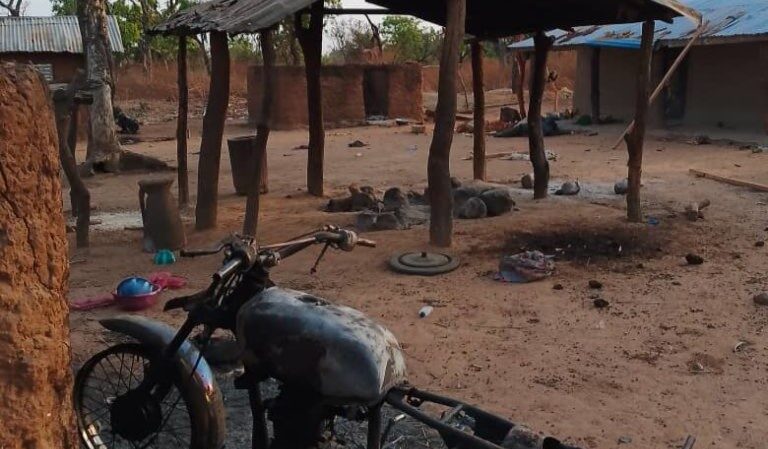AS Nigeria marked its 65th Independence Anniversary on October 1, 2025, a voice from Mubi, Adamawa State, cut through the patriotic messages flooding a Lagos radio station.
Zephaniah Yako, calling from the troubled northeastern town, delivered a painful reminder of life far away from major cities, life in Nigeria’s vast, ungoverned spaces where terrorists roam freely, security access is nearly impossible, and communities are left to fend for themselves.
Yako’s message was simple but urgent: Send security forces to the abandoned hinterlands before the terrorists finish the people.
“You live here in the city and when there is an attack, the police or soldiers can still come,” he said. “But in most hinterlands, terrorism attacks can go on for days without any help because of the difficult terrain, lack of communication and fear.”
His cry reflects the reality of thousands of communities scattered across Nigeria’s massive 923,770-square-kilometre landmass, an expanse roughly equivalent to the combined size of California, Nevada and Utah.
Many of these lands are not just ungoverned, they have become operational bases for deadly criminals, including Boko Haram and armed bandits.
Yako pointed to the Yola–Mubi axis, a stretch of remote villages and rugged terrain that security forces often struggle to access.
“From Yola to Mubi is over 200km. There are hundreds of kilometres dividing most towns, with many ungoverned areas in between,” he explained. “The terrorists know and take advantage of this. They attack at will because they know help will not come.”
Across northern Nigeria, thousands of kilometres separate rural communities. Villages are isolated by poor or non-existent roads, and communication networks are weak or absent conditions that give terrorists free rein.
A senior Army officer who spoke to News Point Nigeria admitted that the security forces themselves are often helpless in the face of Nigeria’s geographical challenges.
“One of the major problems is that even when you get distress calls, there is no road to access many communities,” he said, accusing state governments of neglecting rural infrastructure despite receiving huge monthly allocations.
“I challenge some of the governors to open up these communities. Without roads, you cannot fight insecurity.”
‘Bandits Can Kill Everyone Without Anyone Hearing’: Tech Expert Shares Shocking Experience
Theo Adams, an IT professional, said he never understood how terrorists could wipe out entire communities unnoticed until he travelled by road from Kano to Dutse in Jigawa.
“There are several kilometres of uninhabited land,” he recalled.
“You see a small hamlet of huts, then nothing again for kilometres. If bandits attack, how can anyone escape?”
Nigeria still bears deep scars from attacks launched from the 518 km² Sambisa Forest, arguably the country’s most infamous ungoverned territory. But experts warn that the number of similar hotspots is growing.
Retired senior security officer Bem Hembafan described the north’s vast open terrain as a “gift” to criminal groups.
“From the highways, the hideouts stretch hundreds of kilometres,” he said. “Fighting an enemy that knows the forest better than you is extremely dangerous.”
He praised security forces for their sacrifices but warned that Nigeria’s landmass is too large, and the security manpower too small, to fully protect it under current conditions.
With Nigeria’s population estimated at over 239 million, senior lecturer Onyewuchi Akagbule said the country’s population density 261 people per km creates pockets of empty land that terrorists exploit.
“In many northern communities, settlements are far apart because culture dictates how people live,” he said. “This leaves many ungoverned spaces.”
Akagbule, who recently traveled across Kano, Azare and Potiskum for research, said he was shocked by the vast, empty spaces available for criminals to hide.
“Nigeria has many empty spaces criminals are converting to their base. The danger is real.”
Nigeria has about 370,000 police officers and roughly 300,000 military personnel. But Akagbule warns: “Even if we had five million security personnel, it still wouldn’t be enough to cover the many ungoverned areas.”
Hembafan shares this fear: “Every election day, our barracks are empty because everyone is deployed. Imagine a national crisis lasting days.”
In Benue, orchards and farmlands once known for abundant fruit harvests now lie abandoned. “I see orange and mango farms rotting because farmers cannot go there,” Hembafan said.
In Plateau, Bauchi and Borno, farmlands owned by retired military officers have been overtaken by terrorists. “This is why food is expensive. Farms have become battlefields.”
Kogi cashew farmer Idrisu Ocheno said many farmers now visit their farms only rarely, fearing kidnappers who demand huge ransoms.
An aide to an Enugu politician revealed how state-owned lands and assets across the southeast were illegally appropriated after years of abandonment.
“In some cases, nobody remembered that these properties belonged to the government,” he said.
For many Nigerians like Zephaniah Yako, the urgency cannot be overstated.
“If terrorists continue to occupy these lands, the killings will continue and the world will keep blaming Nigeria,” he said.
Ayeni, a banker, echoed the sentiment: “We must reclaim our forests and ungoverned areas now. If not, Nigeria will continue bleeding.”







